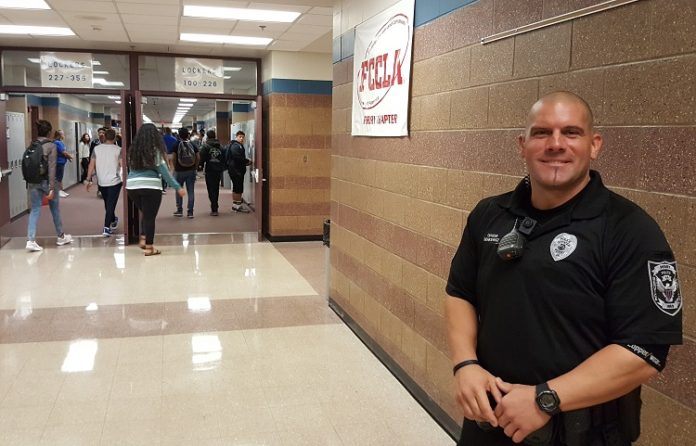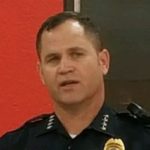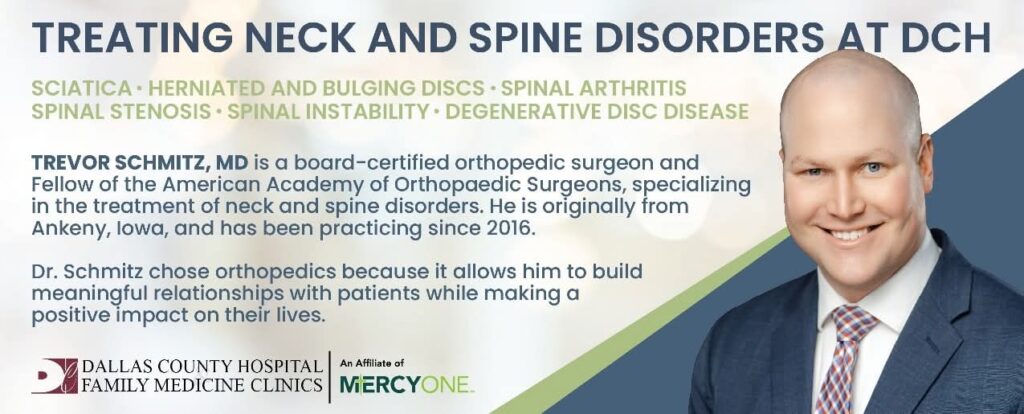
U.S. President Donald J. Trump made a rapid-fire series of suggestions Thursday on the subject of guns, with ideas ranging from arming teachers and “hardening” schools to tightening background checks, raising the age for gun purchases, banning bump stocks and reopening mental hospitals.
At first blush, his ideas for the public schools, with teachers “adept in weaponry” carrying concealed guns on the job, were found dubious by three Perry leaders responsible for school safety, Perry Police Chief Eric Vaughn, Perry Community School District Superintendent Clark Wicks and Perry High School Principal Dan Marburger.

“I haven’t heard what that full proposal would be,” Vaughn said, “so I don’t have much to comment on, but I don’t know that arming the teachers is the solution to that problem. There’s other things that could be explored before we make that decision.”
Vaughn said a number of security people and processes are already in place in the service of Perry’s school children.
“Having a School Resource Office in place who can respond to incidents like this, that’s part of the equation,” Vaughn said, “along with training and education by our department and our faculty and students. Those are things that constantly need to be updated and have new training on, but those things are in place.”
Vaughn said the Perry Community School District Board of Directors could not vote to arm teachers because “right now that would be contrary to what the state law says.” But there could be “initiatives taken by the city or the state or the federal, legislation or mandates that could have an effect on school safety,” he said.

Wicks emphasized the safe atmosphere prevailing at Perry schools, the security doors, the surveillance cameras and the thoroughly trained School Resource Officer.
“Teachers with guns?” Wicks said. “I think that it would be a very, very difficult thing to execute, meaning we want, I believe, to have fewer firearms in a building as opposed to more. People that have firearms, such as the police, are very well trained. To get a person like myself or a teacher trained to that degree and to be able to practice that on a continual basis so that you were sharp, I don’t think that’s a reasonable goal. That’s number one. Number two, we’re trained to educate. We’re not trained to be firing arms.”
Wicks sketched a hypothetical scenario in which law enforcement arrives on the scene of a chaotic active-shooter situation that involves the assailant and some number of armed teachers. It might be hard to know who the criminal was in such a “very convoluted mess,” he said, to say nothing of the dangers of crossfire and other collateral damage.
“I don’t think the first thing we should look at is to get more guns in school to make it safer,” he said. “I’m all for the Second Amendment, but when it comes to schools, I think we have to take a comprehensive approach. I do not believe having more guns is the answer. I think we’re safe. What we have with our SRO and our locked-door policy and things being locked down, we’re pretty safe. We’ve practiced. We have everything in place. We’re safe. Let’s keep moving on, and let’s focus on education as opposed to this.”

Marburger made the opinion unanimous. Responding to the president’s ideas for hardened or fortified schools, the PHS principal said, “I’d be very skeptical. I guess that’s the best way to put it. For me to be yes on that, I’d have to see a lot more details and information and understand about the training that they would receive and what parameters would be put in place on use. It’s just something that I don’t think any of us that got into education ever thought would be something that would even be a possibility. So I’m very skeptical about how all that would happen.”
Like Vaughn and Wicks, Marburger emphasized the security already attained at Perry’s schools.
“I think we’ve done a good job in the last few years of trying to make our campuses more secure with the buzz-in system we now have at the front doorways,” he said, “and we have electronic monitors on each door that can tell us if they’re left open. So we’ve done a really good job with that.”
Tight budgets force the school districts to make difficult decisions.
“I think there’s always things you can do more of,” Marburger said, “but it’s a balance between what you want to value and what you want to spend. There’s only so much money in school districts, and every dollar that we spend toward more security, it’s a dollar away from something else.”
Beyond classroom-based firepower, Marburger sees the mission of the schools in different terms.
“The bigger thing we try to do is build relationships with kids so that we don’t have like what happened at Parkland happen here,” he said. “I think every school in America probably could name some kids that are capable of what happened, but it’s a matter of figuring them out and trying to get them help they need before anything like would happen. I really wish we’d invest more money in mental health resources for our kids before we talk about anything else.”
Like so many other Americans over the last week, students at Perry High School are thinking and talking a lot about Parkland and guns and the political power of the national Rifle Association.
“I had a conversation today with kids at lunch because, you know, they’re talking about this,” Marburger said. “They’re talking about the walkouts and those types of things. I just asked them, I said, ‘Would you guys feel comfortable with having teachers with guns here at school to protect you?’ And they said, ‘You now, I don’t think so. I don’t think that’s the route to go.” And they had another interesting comment. I said, ‘Well, how about having retired military here as guards?’ And it’s almost a little bit of sadness that comes across them when they reply, ‘Well, I hope it doesn’t come to that. I hope I don’t have to go to a school where I have to have guards.’ I think that’s real forthcoming. At the same table with the same kids that I was talking with, we talked a little bit about gun rights, and one kid said, ‘You know, I don’t like what’s happened with these assault rifles, but I’m not sure I would take them away.’ He said, ‘I don’t own guns. I don’t really believe in guns,’ he said, but he’s talking about the right to own a gun. So the kids are thinking about this. They’re probably having debates around the tables in the same way we are on the phone or other people are having around the country. To me it’s sad that we have to talk about this stuff, but it’s weighing on kids’ minds. There’s no doubt about it.”

















[…] said the conversations he and other school staff had with students emphasized the importance of communicating with lawmakers and making their opinions […]